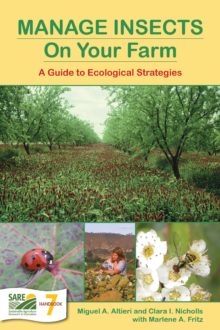Impacts of Fertilizers on Insect Pests
By modifying the nutrient composition of crops, fertilizer practices can influence plant defenses. A review of 50 years of research identified 135 studies showing more plant damage and/or greater numbers of leaf-chewing insects or mites in nitrogen-fertilized crops, while fewer than 50 studies reported less pest damage. Researchers have demonstrated that high nitrogen levels in plant tissue can decrease resistance and increase susceptibility to pest attacks (Table 2). Although more research is needed to clarify the relationships between crop nutrition and pests, most studies assessing the response of aphids and mites to nitrogen fertilizer have documented dramatic expansion in pest numbers with increases in fertilizer rates.
Crops could be expected, therefore, to be less prone to insect pests and diseases where organic soil amendments are used, since these amendments usually result in lower concentrations of soluble nitrogen in plant tissue. Indeed, most studies documenting fewer insect pests in organic systems have attributed these reductions in part to lower nitrogen content in the crop tissues:
- In Japan, the density of whitebacked planthopper (Sogatella furcifera) immigrants in organic rice fields was significantly less than their density in conventional rice fields. Fewer adult females settled in the organic fields and fewer immatures survived, leading to smaller ensuing generations. These results have been partly attributed to lower nitrogen content in the organically farmed crops.
- In England, conventional winter wheat fields were plagued with more rose-grain aphids than their organic counterpart. Top-dressed in April with nitrogen, the plants treated with soluble synthetic fertilizers contained higher levels of free protein amino acids in their leaves in June and attracted larger populations of aphids. Researchers concluded that the aphids found the conventionally grown wheat to be more palatable than the organically grown wheat.
- In Ohio greenhouse experiments, European corn borer females laid significantly more eggs on sweet corn growing in conventionally fertilized soils than they did on plants growing in organically farmed soils collected nearby. Interestingly, egg-laying varied significantly among the chemically fertilized treatments but was uniformly low in organically managed soils. The difference appears to be evidence for a form of biological buffering more commonly found under organic conditions.
- In California, organically fertilized broccoli consistently developed smaller infestations of flea beetles and cabbage aphids than conventionally fertilized broccoli. Researchers attributed those reduced infestations to lower levels of free nitrogen in plant foliage, further supporting the view that farmers can influence insect pest preferences with the types and amounts of fertilizers they use.
- In tropical Asia, by increasing organic matter in irrigated rice, researchers enhanced populations of decomposers and plankton-feeders — key components in the food chain of predators; in turn, numbers of generalist predators of leafhopper pests rose significantly. Organic matter management proved to underlie higher levels of natural biological control.
